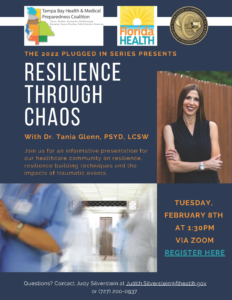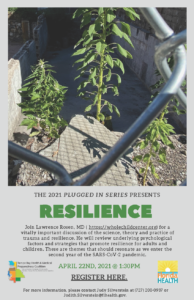Resilience Through Chaos With Dr. Tania Glenn

The impacts of the pandemic on mental health of healthcare workers are significant and ever evolving. Increasing the resiliency of our healthcare workforce is going to be essential to our continued and future response efforts. Here at the Coalition, we are actively looking for ways to support mental health in our healthcare community. Dr. Glenn was the keynote speaker at this year’s National Healthcare Coalition Preparedness Conference, and her presentation was the highlight of the event! We are excited to give our members the opportunity to hear her presentation as well!
Tania Glenn responded to the terrorists’ attacks at the Murrah Federal Building in Oklahoma City in 1995 and to Ground Zero in New York City in 2001, Hurricane Katrina in 2005, the Dallas Police shootings in 2016 and the Active Shooter at the Ft. Lauderdale Airport in 2017 as a first responder and licensed clinician from Austin, TX. Having worked with thousands of homeland defense and security professionals in supporting multiple military campaigns and/or critical incidents, Tania specializes in the identification and treatment of severe stress and trauma. And because Tania focuses on the aviation, military, and public safety communities, she has worked with hundreds of individuals in combating their PTSD. Tania has been in practice for thirty years interacting with professionals from the federal, state, and local arenas. Tania’s colleagues refer to her as a “warrior healer” because she is passionate about her work and dedicates her practice to helping those who serve and protect.
Her presentation discussed:
- The definition of resilience
- Understanding resilience building techniques
- Identifying when a traumatic event is becoming problematic and understanding treatment options.
Resilience with Dr. Lawrence Rosen

Dr. Rosen reviewed underlying psychological factors and strategies that promote resilience, themes that should resonate with each of us due to the SARS CoV-2 pandemic. He examined why and how building inner resilience is the key to emotional and physical well-being. We explored practical stress-coping strategies, grounded in neuroscience, mindfulness, and positive psychology, as a way to cultivate resilience in these turbulent times.
Lawrence Rosen, MD is an integrative pediatrician and founder of the Whole Child Center. (https://wholechildcenter.org) He is the co-author of “Treatment Alternatives for Children,” an evidence-informed guide for parents interested in natural solutions for common childhood ailments. Dr. Rosen is appointed as Assistant Professor in Pediatrics at the Hackensack Meridian School of Medicine at Seton Hall University. Additionally, he is a founding member and former Chair of the AAP Section on Integrative Medicine, and he received the AAP’s Pioneer in Integrative Medicine award in 2015. A graduate of New York Medical College and the Massachusetts Institute of Technology, he completed his residency and chief residency in pediatrics at Mount Sinai Hospital in New York. Dr. Rosen received his yoga teacher certification under the guidance of Ben Wisch and Denise DeLuca and teaches yoga and meditation to medical students. He serves as Senior Advisor and Chair of the Health Advisory Board for WholeHealthED, a nonprofit devoted to bringing whole health learning to U.S. schools. Most importantly, he is happily married to the love of his life and the proud father of two amazing young adults.
Emergency Responders Self Care Plan
Being a resilient responder starts with a commitment to taking care of yourself. This can be increasingly difficult during a pandemic, where responders experience additional stressors related to home and personal circumstances as well as those brought on by challenging mission demands. There are important steps you can take to keep yourself healthy and fit for duty as you take care of others. Complete this self-care plan before each mission/event and keep it with you so that you are ready to apply coping strategies when things get tough.
